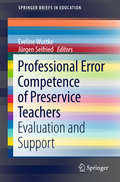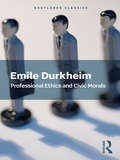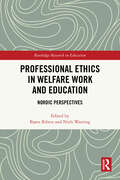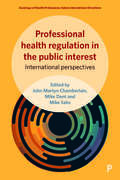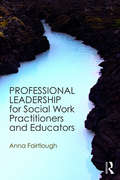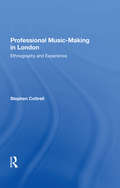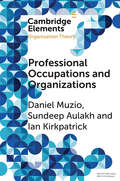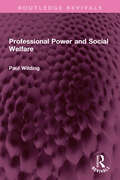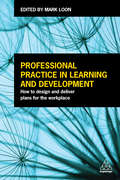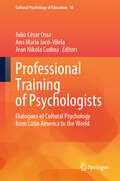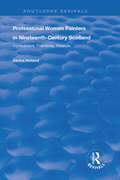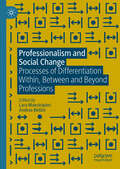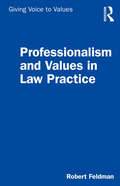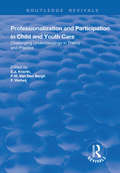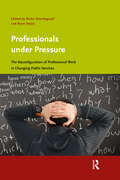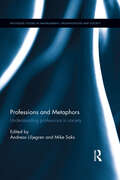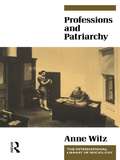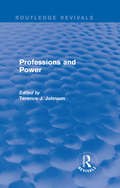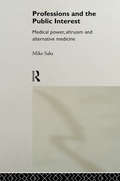- Table View
- List View
Professional Error Competence of Preservice Teachers
by Jürgen Seifried Eveline WuttkeThis book discusses competence, teacher competence, and professional error competence of teachers, and emphasizes the need for a training programme that supports the latter. The book starts out by presenting results from previous studies that underline the necessity to train professional error competence of teachers, especially in the field of accounting. The studies analysed include research in the field of accounting, and on the efficacy of teacher training. Next, considerations on training programmes are presented. From these analyses, a training programme was designed to support professional error competence in accounting. This training programme aims for increased knowledge about students' errors (content knowledge) and offers strategies to handle these errors (pedagogical content knowledge). Both are central facets of professional error competence. The book describes the development, characteristics, implementation, and evaluation of this programme. It details the test platform that was developed and used for the assessment of professional error competence, and critically discusses the results from the evaluation of the training programme from various perspectives. The current discussion on teacher training and expertise is influenced by empirical results obtained in international large-scale studies such as PISA and TIMSS. The findings of the studies underpin the discussion on teaching quality and teachers' professional competences. The key issue is that teacher competence has an impact on teaching quality and this, in turn, influences students' achievements. International comparative studies reveal that teachers often lack central competence facets, and therefore it is assumed that standard teacher training programmes may fail to successfully prepare student teachers for their tasks. Therefore, customized training programmes are currently being discussed. Their focus is mostly on pedagogical content knowledge and classroom practices, because these competence facets are essential for teaching quality.
Professional Ethics and Civic Morals (Routledge Classics)
by Emile DurkheimÉmile Durkheim is one of the founding fathers of sociology and Professional Ethics and Civic Morals is one of his most neglected yet insightful works. Durkheim's view that the instability of industrial society was connected to the decline of religion and his characterization of the state as the ultimate moral force in society reveal his lifelong engagement with the relationship between the individual and society. In Professional Ethics and Civic Morals Durkheim poses a major question: given the negative social consequences of unfettered markets, which caused what he termed ‘anomie’, how is the state to reconcile morality with the market? Durkheim argues that the answer is to be found in the evolution of a civil religion, in the form of professional codes and civic values, which would counteract the effects of individualism, just as guilds had regulated medieval economic life. Arguing that the state has a vital role to play in moral life and that morals are at bottom social facts – a controversial position which drew considerable criticism – Durkheim also argues that the state had a duty to protect the rights of the individual, via a form of cosmopolitan patriotism. Durkheim also articulates a highly original and critical interpretation of the rules around property and inheritance – a perspective which resonates with debates about inequality and the redistribution of wealth today. Included in this Routledge Classics edition is a new introduction by Bryan S.Turner, placing Durkheim in contemporary context and outlining the key tenets of Professional Ethics and Civic Morals.
Professional Ethics in Welfare Work and Education: Nordic Perspectives (Routledge Research in Education)
by Bjørn Ribers Niels WarringFundamentally concerning the relationship and dynamics between education, professionalism and ethical awareness, this interdisciplinary, edited volume showcases novel research perspectives on professional ethics in education, practice, and the work life of welfare professionals in the Nordic countries.Contextualising the term ‘welfare professions’ as the collective definition of teachers, early childhood educators, social educators, social workers and nurses in the Nordic countries, the book chiefly concerns their ability to navigate within the complex political and institutional frameworks that surround their working environments. Chapters position their competence to act with strong critical, ethical awareness and integrity as a key tenet of a well-functioning education system, and provide research-based perspectives and reflections on how the dichotomy between ethical standards and realities of practice can lead to ethical pressure and moral distress. With contributions from Denmark and the Nordic countries, as well as Canada and the US, the book offers empirical and theoretical perspectives into the relationship between education, professionalism and ethical awareness, and is supported with empirical examples and research-based case studies. Ultimately, the book showcases and promotes research aimed at strengthening professionalism based on critical, innovative and practice-focused education.This enlightening book will be essential reading for global academics, researchers and postgraduate students in the fields of pedagogy, professional development, the sociology of education, and education ethics more broadly. Those involved with issues of welfare in society, working life research, policy and professional values will also find the volume of use.
Professional Health Regulation in the Public Interest: International Perspectives (Sociology of Health Professions)
by John Martyn Chamberlain, Mike Dent and Mike SaksThere are significant variations in how healthcare systems and health professionals are regulated globally. One feature that they increasingly have in common is an emphasis on the value of including members of the public in quality assurance processes. While many argue that this will help better serve the public interest, others question how far the changing regulatory reform agenda is still dominated by medical interests. Bringing together leading academics worldwide, this collection compares and critically examines the ways in which different countries are regulating healthcare in general, and health professions in particular, in the interest of users and the wider public. It is the first book in the Sociology of Health Professions series.
Professional Interviewing (Routledge Library Editions: Human Resource Management #28)
by Owen Hargie Rob Millar Valerie CruteThis book, first published in 1992, presents a detailed, informed and informative account of research, theory and practice in interviewing. As a single source for practitioners, it focuses on the professional practice of interviewing as a strategy for achieving specific objectives. As well as providing reviews of recent research in interviewing, it includes practical examples of interviewing in many different contexts. The authors, all of whom have wide experience of interviewing, draw on a wealth of information and insight acquired during their work. They examine the definitions and purposes of interviewing and then describe the main settings within which it takes place - counselling, selection, research, medical and appraisal. Taking a social interactional model of interviewing, they discuss the main components of the activity: person perception; interviewer goals; interview structures and stages; effective interviewing skills; and the interviewee's perspective on the interview process. Examples are used to illustrate particular issues and to highlight their relevance to practice. The authors also consider important ethical and professional problems which may crucially affect the practice of interviewing. This book should be of interest to professionals and students in psychology, health, counselling, human resource management and business.
Professional Leadership for Social Work Practitioners and Educators
by Anna FairtloughProfessional leadership is increasingly recognised as being vital to enhancing social work’s reputation and effectiveness. Although professional leadership is one of the nine domains of the professional capability framework in England, sometimes leadership is assumed to be the prerogative of managers rather than the responsibility of all professional social workers. The participation of social workers and social work educators in shaping professional cultures within organisations through practice innovation, practitioner research and workforce development is thus crucial. Drawing on theories that challenge hierarchical concepts of leadership, this book will enable experienced social work practitioners and educators to develop their professional leadership to more expert levels. Throughout the book there are case examples illustrating examples of advanced professional leadership in action, research highlights and exercises utilising self-reflection, action planning, creative writing and imagery to provide practical support to the reader.
Professional Music-making in London: Ethnography and Experience (Soas Musicology Ser.)
by Stephen CottrellProfessional Music-Making in London is an engaging yet innovative study which examines the lives and work of Western art musicians from an ethnographic perspective. Drawing in part on his own professional experience, Stephen Cottrell considers to what extent musicians in Western society conform to Alan Merriam's paradigmatic assessment of them as having low status yet high respect, as well as being given an unusual degree of licence to deviate from convention. The book draws on a wide variety of approaches from scholars elsewhere: from ethnomusicologists such as Bruno Nettl and Henry Kingsbury, performance theorists such as Richard Schechner and Victor Turner, as well as psychologists such as Sigmund Freud and Melanie Klein. This rich intellectual heritage provides the framework for discussion of a variety of themes, including how musicians conceive their self identity and how this is negotiated in the professional musical world; how the deputy system facilitates musical exchange and engenders gift relationships; how humour lubricates social and musical relationships and mitigates the stresses of musicians' lives; and how the events in which musicians participate can be viewed as quasi-rituals, and thus related to analogous events in non-Western cultures. The focus of this study is on professional music-making in London, one of the world's busiest centres of musical performance - yet the issues raised and explored are deeply relevant to other major centres of Western art music, such as New York, Berlin or Sydney. Ethnomusicologists, anthropologists, musicologists, performers, teachers and concert-goers will find this book a stimulating insight into, and investigation of, Western art musicians and their place in today's world.
Professional Occupations and Organizations (Elements in Organization Theory)
by Daniel Muzio Sundeep Aulakh Ian KirkpatrickIn this Element, we engage with fundamental questions concerning the future trajectory of professions as a distinct occupational category and of the formal organizations, which represent, employ or host professionals. We begin with a literature review that identifies a functionalist, power and institutionalist lens for the study of professional occupations and organizations. We then review a series of challenges which face the contemporary professions. Finally, we explore contemporary developments in the worlds of professions applying three units of analysis: macro (professional occupations and their associations), meso (professional organizations) and micro (professional workers).
Professional Power and Social Welfare (Routledge Revivals)
by Profesor Paul WildingFirst published in 1982, Professional Power and Social Welfare examines the nature, extent and significance of professional power in the broad area of social welfare. Paul Wilding fills a major gap in the literature of the welfare professions. He looks at the power of the professions in policymaking, in resource allocation, their power over people, their power to define needs and problems, and their limited accountability. He analyses the basis of this power, and reviews criticism of the claims, achievements, knowledge and ideals of the professions. His conclusion is that the only satisfactory relationship between professions, clients and society must be one of partnership: a balance of professional, political, bureaucratic and consumer power. This book will be of interest to students of sociology and political science.
Professional Practice in Learning and Development: How to Design and Deliver Plans for the Workplace
by Mark LoonProfessional Practice in Learning and Development guides learning and development practitioners and students in designing and delivering effective people development in the modern organization. It is a core text for those studying for learning and development qualifications such as the Chartered Institute of Personnel and Development Intermediate level, and a useful handbook for those in learning and development roles looking to develop their understanding of the latest developments facing the profession. With a particular focus on digital, blended and social learning it will help you deliver more for less. Starting with an introduction to learning and development, it shows how to make the business case for activities, use metrics to demonstrate the value add, and engage the right stakeholders.Drawing on the latest research, Professional Practice in Learning and Development highlights the new opportunities made available to the learning and development practitioner by technology, new media and the networked world in which we live. It looks at approaches to helping people learn and how to develop tailored solutions. Case studies and reflective questions develop skills in facilitating collaborative learning, working in teams, and communicating effectively with all stakeholders. This book also equips you to measure and communicate the value of the programmes and, drawing on insights from neuroscience, demonstrates some practical new tools for engaging learners to improve the effectiveness of their work.
Professional Training of Psychologists: Dialogues of Cultural Psychology from Latin America to the World (Cultural Psychology of Education #18)
by Julio César Ossa Ana Maria Jacó-Vilela Jean Nikola CudinaThis book represents an intellectual journey through the history, culture, and training of psychologists in Latin America to transcend borders. It analyzes the inception of academic programs in each country in the region, exploring the socio-political and economic context, and delves into the conceptual, methodological, and epistemological aspects of training. Similarly, it discusses how psychology prepares professionals for their roles in society and provides updated data on the discipline's growth in the region. Furthermore, it promotes international and intercultural dialogue, enriching the global understanding of psychology. The book's emphasis on adopting a historical and cultural approach is essentially an effort to introduce a critical component to the analysis of psychologist professional training. This component adds value for the reader and aids in understanding how Latin American psychology has been shaped by historical events, social movements, government policies,and the diverse cultural traditions of the region. Readers will gain a profound understanding of why psychology has developed in a particular way in each Latin American country, shedding light on significant variations in psychological practice and theory in this part of the world. Essentially, this work constitutes an invaluable resource for academics, professionals, and anyone interested in understanding the intersection between psychology and the rich historical and cultural diversity of Latin America.
Professional Women Painters in Nineteenth-Century Scotland: Commitment, Friendship, Pleasure (Routledge Revivals)
by Janice HellandThis title was first published in 2000: Women in the 19th century have long been presented as the angel in the house. The author re-writes this history by investigating the life and working conditions of a number of middle-class women who sought to establish themselves as professional artists in Scotland. Contrary to the orthodox view preoccupied with oppression and difficulty, the author demonstrates that women artists of the period were independent producers, teachers and travellers, alert to changes in taste and fashion. They derived great pleasure from their work, and enjoyed the benefits of women working together, forming their own and joining existing professional associations. The book is not biographical but elaborates on the life and working conditions of middle-class artists by discussing their work in terms of economic and social history.
Professional Wrestling: Sport and Spectacle, Second Edition (Performance Studies Series)
by Sharon MazerProfessional wrestling is one of the most popular performance practices in the United States and around the world, drawing millions of spectators to live events and televised broadcasts. The displays of violence, simulated and actual, may be the obvious appeal, but that is just the beginning. Fans debate performance choices with as much energy as they argue about their favorite wrestlers. The ongoing scenarios and presentations of manly and not-so-manly characters—from the flamboyantly feminine to the hypermasculine—simultaneously celebrate and critique, parody and affirm the American dream and the masculine ideal. Sharon Mazer looks at the world of professional wrestling from a fan’s-eye-view high in the stands and from ringside in the wrestlers’ gym. She investigates how performances are constructed and sold to spectators, both on a local level and in the “big leagues” of the WWF/E. She shares a close-up view of a group of wrestlers as they work out, get their faces pushed to the mat as part of their initiation into the fraternity of the ring, and dream of stardom. In later chapters, Mazer explores professional wrestling’s carnivalesque presentation of masculinities ranging from the cute to the brute, as well as the way in which the performances of women wrestlers often enter into the realm of pornographic. Finally, she explores the question of the “real” and the “fake” as the fans themselves confront it. First published in 1998, this new edition of Professional Wrestling: Sport and Spectacle both preserves the original’s snapshot of the wrestling scene of the 1980s and 1990s and features an up-to-date perspective on the current state of play.
Professionalisierung der Moscheegemeinden: Ausgangslage, Herausforderungen und best Practice Beispiele (Islam in der Gesellschaft)
by Rauf Ceylan Samy CharchiraDieser Sammelband nähert sich dem Thema zunächst aus einer historischen Perspektive an und geht der Frage nach der Entwicklung der Religionsgemeinschaften, insbesondere nach der Gründung der Bundesrepublik Deutschland und der seither verfassungsrechtlich verbrieften Rechte und Privilegien von Religionsgemeinschaften und ihr weitreichenden Kooperationen mit dem säkularen Staat. Der Sammelband geht auch der Frage nach dem juristischen Status von Religionsgemeinschaften. Spätestens seit Anspruchserhebung Islamische Dachverbände in Deutschland auf dem Status der Körperschaft des öffentlichen Rechtes entfacht eine gesellschaftliche Debatte über Möglichkeiten der Anerkennung (oder Nichtanerkennung) von Islamischen Dachverbänden als Religionsgemeinschaften an. Der Sammelband widmet sich dann die Frage nach Aufgaben und Herausforderung (islamische) Religionsgemeinschaft im Kontext von Recht, Gesellschaft und Politik und erforscht die internen und externen Faktoren, die einen Professionalisierungsprozess von Moscheegemeinden fördern oder behindern können.
Professionalism and Social Change: Processes of Differentiation Within, Between and Beyond Professions
by Lara Maestripieri Andrea BelliniThis book guides the reader in discovering contemporary professions and the critical changes they have lived through after the post-industrial transformation of advanced capitalist societies. Two interrelated concepts are used to interpret what is happening in professional work: differentiation, namely the set of processes by which professions and professionalism have become more diverse, and heterogeneity, the outcomes of such processes. A novel analytical framework delves into differentiation and understands heterogeneity based on three dimensions: within (how professions are structured internally), between (how professions distinguish themselves from other occupations and from each other), and beyond (how professions govern societal changes and influence differentiation processes). The book presents a collection of studies covering different countries and professions to demonstrate the analytical potential of the within-between-beyond model. The conclusions show how “neo-liberal” professionalism is putting the very idea of collegiate professions at stake while exposing emerging professions to market risks.
Professionalism and Values in Law Practice (Giving Voice to Values)
by Robert FeldmanThis book presents practical advice to law students and those entering and now working in the legal profession that will help them to reconcile who they are as a person with the demands and opportunities of a legal career. The book sets out a clear framework and practice examples for: (i) defining “success”, (ii) understanding the role of a professional in relation to clients, colleagues, adversaries and community, (iii) reconciling demands of practice within ethical rules and norms, business considerations and personal values and (iv) building a values-centered, economically viable practice and reputation. Complete with practical advice and experiences that produce and reinforce a holistic approach, this book provides invaluable support for second- and third-year law students and lawyers in practice to establish elusive work-life balance over the course of a legal career.
Professionalitätsentwicklung in der Erwachsenenbildung & Weiterbildung als Mehrebenen-Phänomen: Eine qualitative Einzelfallanalyse am Beispiel einer Organisation der beruflichen Weiterbildung (Theorie und Empirie Lebenslangen Lernens)
by Lisa BreitschwerdtDiese Studie untersucht Professionalitätsentwicklung in der Erwachsenenbildung/Weiterbildung aus einer Mehrebenen-Perspektive. Professionalitätsentwicklung wird vor dem Hintergrund sich wandelnder Arbeitskontexte und veränderter Handlungsanforderungen an das Weiterbildungspersonal nicht mehr nur als individuelle Aufgabe, sondern als ebenen-übergreifendes Phänomen verstanden. Die Untersuchung arbeitet in verbindender Analyse zentraler Diskurse die Bedeutung der verschiedenen Ebenen Personal, Organisation, Dachorganisation und gesellschaftlicher Rahmen für die Professionalitätsentwicklung heraus und verortet die zentralen Erkenntnisse in einem Mehrebenen-Modell. Dieses wird im Rahmen einer qualitativen Einzelfallanalyse empirisch untersucht. Der herangezogene Einzelfall liegt aus dem Kontext des Forschungsprojektes „Konturen der Professionsentwicklung in der beruflichen Weiterbildung (KOPROF)“ vor. Basierend auf einem theoretisch informierten und gleichzeitig explorativen Zugang legt die Studie Ergebnisse zu einer ebenen-übergreifendenProfessionalitätsentwicklung vor, die neben einem ersten Überblick zahlreiche Anschlüsse für weitere Forschungsvorhaben eröffnet. Die Studie zeigt, dass den Dachorganisationen und Weiterbildungsorganisationen eine besondere Rolle in strukturierender und vermittelnder Funktion im Mehrebenen-Modell der Professionalitätsentwicklung zukommen. Weiter konnte in der Studie herausgearbeitet werden, dass die Entwicklung von Professionalität als Vermittlungshandeln zwischen unterschiedlichen Handlungslogiken in heterogenen und interdisziplinären Arbeitskontexten zunehmend einrichtungsspezifische und ebenen-übergreifende Perspektiven erfordert.
Professionalization and Participation in Child and Youth Care: Challenging Understandings in Theory and Practice
by F. Verheij E. J. Knorth P.M. Van Den BerghThis title was first published in 2002. The field of child and youth care is under increasing pressure to optimize its mission: to deliver high quality support and to help children, parents and families in need of care. Two questions have arisen in many countries in the face of this pressure: the professional quality of childcare and the participant quality of childcare. These issues have traditionally been discussed separately; this unique book brings them together for an enlightening discussion. Examining the possible antagonism of childcare workers operating as professionals and clients participating as fully engaged partners, the book brings to light a new vision on developments and research in the field and informs the reader on recent findings. The expertise of the contributors makes this a truly valuable read for practitioners, policy makers, researchers and students in the field of child and youth care.
Professionals under Pressure: The Reconfiguration of Professional Work in Changing Public Services (Care & Welfare)
by Bram Steijn Mirko NoordegraafOver the past decade, public services have come under increasing pressure to perform like private-sector organisations. This study demonstrates that professionals have much leeway in coping with changes caused by IT developments, distributed knowledge and more demanding public which have all created new pressures on public services. The authors conclude that rather than demanding more autonomy and space, public service professionals need renewed and workable professional standards.
Professionelles Handeln Pflegelehrender angesichts ethischer Herausforderungen
by Anne-Christin LindeDie Pflegebildung unterliegt aktuell vielfältigen Veränderungen und wachsenden Anforderungen. Lernende in der Pflegeausbildung sind zunehmend heterogen hinsichtlich ihrer Bildungsbiografien. Die Bedingungen in der praktischen Pflegeausbildung sind vermehrt geprägt durch Arbeitsverdichtung bei gleichzeitig komplexer werdenden Pflegesituationen. Professionelles Handeln bedarf gerade angesichts dieser konstitutiven und aktuellen Anforderungen einer Verantwortungsübernahme durch Pflegelehrende sowie ermöglichende Rahmenbedingungen. Professionell zu handeln bedeutet auch, situativ im Einzelfall ethisch begründete Entscheidungen zu treffen. Hierfür bedarf es einer ethischen Orientierung in Form einer Berufsethik. Für die Entwicklung einer Berufsethik Pflegelehrender muss mehr über deren ethische Herausforderungen in Erfahrung gebracht werden. Das vorliegende Buch beschreibt ethische Herausforderungen Pflegelehrender, um einen professionellen Umgang damit zu befördern.
Professions and Metaphors: Understanding professions in society (Routledge Studies in Management, Organizations and Society)
by Mike Saks Andreas LiljegrenProfessions and Metaphors: Understanding Professions in Society explores the way that two traditions have contributed to our understanding of both theory and society over recent decades. In the first tradition, the growing literature on metaphors has helped to guide thinking, providing insights into such phenomena as the study of organizations. In the second, there has been an increased interest in professions, from lawyers and university academics to doctors and social workers. This edited collection brings together these two traditions for the first time, providing a unique and systematic overview, at macro and micro level, of the use of metaphors in the sociology of professions. A range of professional fields are explored, from law and medicine to social work and teaching, showing how metaphors can enhance our understanding of the operation of professional groups. By demonstrating how metaphors can add to our understanding of professions in society, as well as in professional practice, this ground-breaking book makes an invaluable contribution to advanced students and researchers in fields such as the sociology of professions and work and organization – as well as informing professionals and policy makers themselves.
Professions and Patriarchy (International Library of Sociology)
by Anne WitzThis impressive and original study is one of the first books to combine mainstream sociology with feminism in exploring the subject of the professions and power.This is an important addition to the corpus of feminist scholarship... It provides fresh insights into the way in which male power has been used to limit the employment aspirations of women in the middle classes. - Rosemary Crompton, University of Kent
Professions and Power (Routledge Revivals)
by Terence J. JohnsonFirst published in 1972, this book rejects as inadequate the ‘trait’ and ‘functionalist’ theories of the professions and instead presents an alternative framework to analyse the contemporaneous occupational change in industrial societies. The author describes how occupational specialisation creates varying degrees of social distance between producers and consumers of goods or services, thus several institutions of control social have developed — collegiate, corporate or oligarchic patronage, mediative. The author looks at the social conditions necessary for the development of these methods of control and the apparent decline of professionalism in both developed and undeveloped societies.
Professions and Professional Service Firms: Private and Public Sector Enterprises in the Global Economy (Routledge Advances in Management and Business Studies)
by Mike Saks Daniel MuzioProfessions are increasingly linked with enterprise at a number of interrelated levels. By considering the relationship of professions to the enterprise contexts in which they work, this book reveals the dilemmas posed to professional groups, and the opportunities and constraints that can arise in their organisational frameworks. Addressing both private and public sectors, this collection explores questions including: what are the implications for the culture, practices and identities of professions of working in enterprise contexts, including with increased globalisation? Are professions becoming more entrepreneurial in a knowledge economy? What are the tensions between professionalism and enterprise and how are these resolved? These are themes that are extremely important to professionals and their managers, especially with the rise of large-scale professional service firms serving corporate clients with truly global reach. This cutting-edge collection will be of interest to researchers, educators and advanced students studying professional behaviour in fields such as business studies, management, organisational analysis, public administration, political science, social policy and sociology, as well as students on focused programmes of professional study in fields such as health, law and social care.
Professions and the Public Interest: Medical Power, Altruism and Alternative Medicine
by Mike SaksThe importance and influence of professions in public life has grown increasingly over the twentieth century but the question of whether they subordinate their own self-interests to the public interest has yet to be adequately researched within a major sociological perspective. In Professions and the Public Interest Mike Saks develops a theoretical and methodological framework for assessing professional groups in Western society. The empirical applicability of this framework is demonstrated with particular reference to a novel case study of the response of the medical profession to acupuncture in the nineteenth and twentieth centuries. Professions and the Public Interest will be of great interest to all lecturers and students of social policy, sociology, and medical sociology as well as to professional groups and their members.
